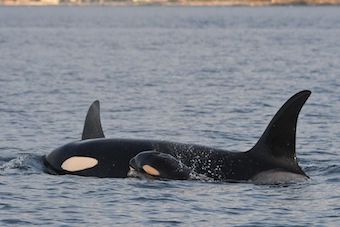Both the United States and Canada have designated the Southern Resident orca population as endangered. For this reason, a new baby is an event to be celebrated. We need to temper that, however, with the knowledge that two out of three pregnancies this year did not make it to term. There can be any number of factors driving this, but by far the most likely explanation is that the orcas are starving.
If we want to help them there are things we can do. We owe them this much. Environmental factors which threaten them didn’t come about because of their actions. They came about entirely because of ours.
First of all, we help the orcas if we help the Chinook salmon recover. Being the whale’s primary food source, the crash of salmon populations has been disastrous for them. Strong regulations to restrict the fisheries (or even better, to suspend them indefinitely) would go a very long way. Another would be the removal of a series of dams on the Snake River in WA, which have largely contributed to this problem. Breaching these would likely increase the number of salmon (and a number of other fish species) by a factor of two-to-three times.
The next thing the orcas need from us is that we leave them alone. Traffic through their primary habitat brings pollution and noise, and increases the risk of boat collisions. We know that marine mammals can bounce back if we let them live under the right conditions. An example is the impressive recovery of humpback whales along the Pacific Coast. Orcas deserve to get the same opportunity.
We’ve also got the science on our side on this one, affirming the case for expanded protected areas and more effective enforcement. Canada’s Fisheries and Oceans Minister Joyce Murray can play a significant and helpful role here. This includes making sure that whale-watching vessels abide by the rules, which were recently strengthened with regards to the Southern Residents. In cases like this one, with a population under so much pressure, it’s especially important that we keep our distance. Research tells us that orcas are easily disturbed by the noise of nearby boats, making it harder for them to catch food. Operators who ignore this can and should have their licenses removed.
Down the road, we can resume these activities using industry best practices, such as the World Cetacean Alliance’s Responsible Whale Watching Certification and Whale Heritage Sites program. For now, let’s give the Southern Residents as much breathing room as possible – meaning let’s leave them alone altogether. For them, these are not normal times.
Next, we need to recognize their needs as a priority when we make economic decisions in the region. An example is the Roberts Banks Terminal 2 Project, a proposed new hub for marine container traffic. The Vancouver Port Authority, which leads this initiative, states that because the terminal would be located in deep, subtidal waters, environmental impacts would be minimized. Others disagree, and believe that the new facility would be an existential threat to our iconic Southern Residents. Lawyers for Ecojustice Canada have been among those who’ve presented a forceful case to the Impact Assessment Agency against proceeding with the project.
Ultimately, the decision on whether to proceed with Terminal 2 will rest with the Minister of Environment and Climate Change, Steven Guilbeault. We urge him to listen to scientists on this one, and if they warn that the best available body of knowledge suggests harm will be done to the biodiversity and ecological health of the area, we should reject this project, regardless of the proposed economic benefits.
A healthy and thriving orca population in the region is important. Killer whales have a special cultural, even spiritual significance to communities around the Salish Sea. They feature prominently in the art and folklore of peoples both indigenous to the Pacific northwest, and to today’s cultural mainstream. To the Lummi Nation, they are kin – ‘family who live under the waves’.
Then there is the role they play in the ecological health of the entire Salish Sea, for which they are properly viewed by scientists as an indicator species. A decline in their populations should worry all of us because of what it portends for the health of the whole marine ecosystem.
We need to address the stressors on both the whales and on the system as a whole. For reasons both aesthetic and practical, this is not a species we can afford to lose.
For The Orca’s Voice,
Chris, Canadian Cetacean Alliance



Leave a Reply